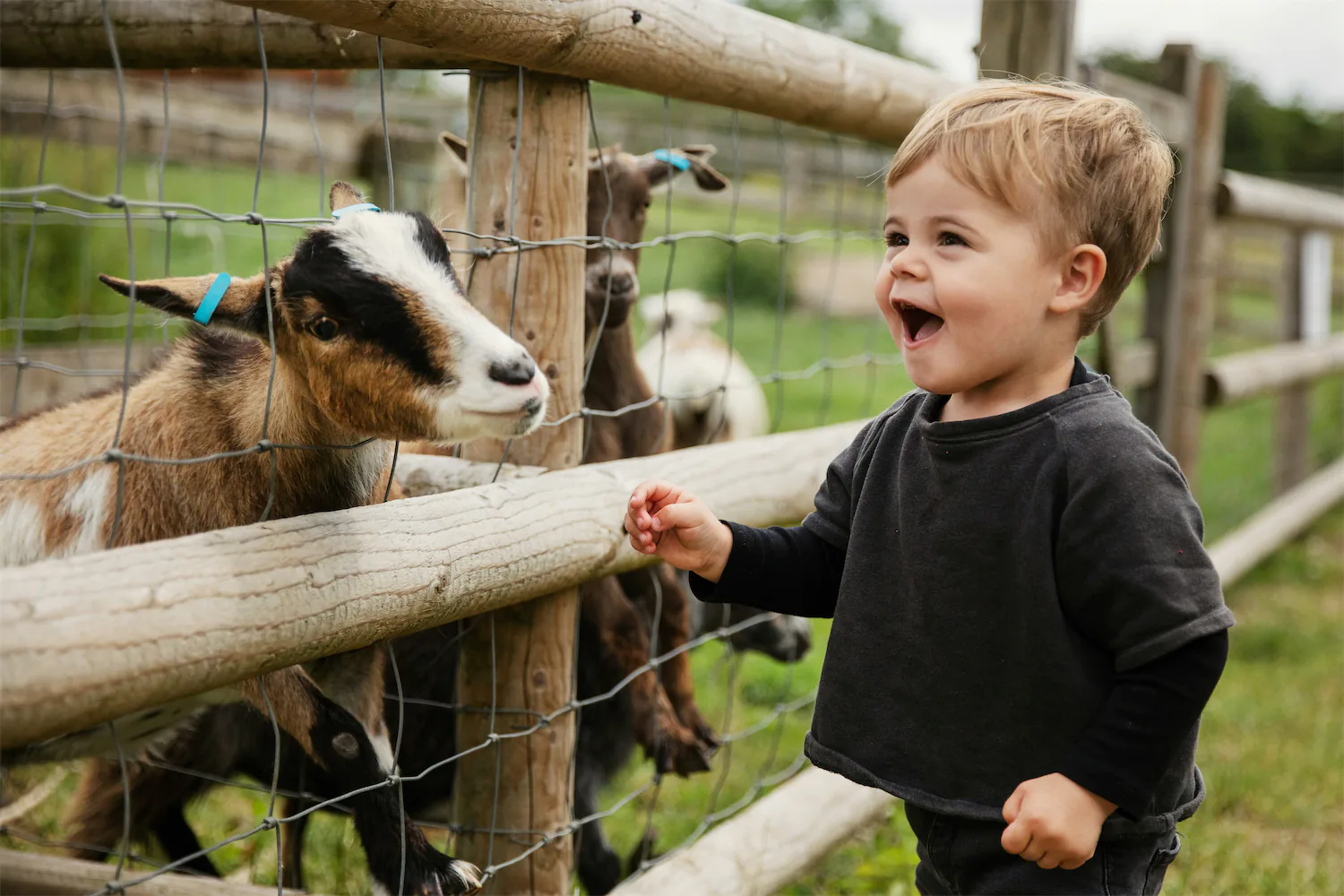Reconociendo las señales de estrés en bebés, niños pequeños y preescolares
Reconociendo las señales de estrés en bebés, niños pequeños y preescolares

Dahlia Rimmon, RDN
Redactor de Contenidos

Dra. Marcy Borieux
Pediatra



Nuestro mundo está lleno de estrés, y los niños navegan en una corriente constante de actividades, distracciones y desafíos que pueden causar estrés. Reconocer los signos y desencadenantes del estrés es esencial para brindar el apoyo que necesitan.
Signos de estrés en bebés (0 a 12 meses)
Llanto excesivo
Irritabilidad y fastidio
Cambios en los patrones de sueño
Dificultades para alimentarse
Apego y necesidad de contacto físico
Retiro de interacciones sociales
Cambios en las expresiones faciales que indican angustia o dolor
Signos de estrés en bebés (1 a 3 años)
Regresión en hitos del desarrollo (como mojar la cama o chuparse el dedo)
Cambios en el apetito
Apego o ansiedad por separación
Quejas físicas de dolores de estómago o de cabeza
Evitación social
Agresión o desafío
Signos de estrés en preescolares y niños mayores (4 a 12 años)
Cambios en el rendimiento académico
Irritabilidad
Cambios de humor
Quejas físicas de dolores de estómago o de cabeza
Retiro de amigos o actividades sociales
Cambios en los patrones de sueño
Cambios en los hábitos alimenticios
Ansiedad
Dificultad para concentrarse
Cómo los padres pueden ayudar a los niños a sobrellevar el estrés
Reconocer los signos de estrés en los niños es el primer paso para brindar apoyo. El siguiente paso es apoyarlos en el manejo de ese estrés. Aquí hay algunas formas de ayudar a su hijo a sobrellevar el estrés, según su edad:
Gestión del estrés: Bebés (0 a 12 meses)
Mantener una rutina consistente
Brindar confort físico
Crear un ambiente tranquilo
Vigilar y responder a las señales de angustia
Gestión del estrés: Niños pequeños (1 a 3 años)
Ofrecer opciones para dar a su hijo una sensación de control
Proporcionar muchas oportunidades para jugar, relajarse y descomprimirse
Usar el refuerzo positivo para conductas de afrontamiento
Gestión del estrés: Preescolares y niños mayores (4 a 12 años)
Fomentar la comunicación abierta
Ayudar a su hijo a identificar y expresar sus emociones
Promover la actividad física
Enseñar técnicas de relajación (como respiración profunda o meditación)
Brindar un ambiente de apoyo
Habilidades de afrontamiento para aliviar el estrés
Las habilidades de afrontamiento son estrategias que pueden usar los niños para manejar grandes emociones, ansiedad y estrés. Estas habilidades son importantes porque ayudan a los niños a regular sus emociones y respuesta al estrés, desarrollar resiliencia y enfrentar los desafíos con confianza. Aquí hay algunos ejemplos de habilidades de afrontamiento para aliviar el estrés:
Ejercicios de respiración (respiración de globo, respiración del oso de peluche, respiración de montaña rusa)
Ejercicio de conexión con los sentidos
Crear una caja especial donde los niños pueden "guardar" sus preocupaciones o estrés
Enseñar frases simples y afirmativas como "Puedo hacerlo" o "Soy valiente"
La actividad física ayuda a liberar tensión y producir hormonas calmantes (saltos de tijera o correr en su lugar)
Dibujar o colorear
Crear un rincón tranquilo con libros, almohadas y un objeto de confort
Soplar burbujas
Cuándo consultar a un pediatra
Si el estrés de su hijo interfiere con la vida diaria (escuela, amistades, sueño) o si causa frecuentes estallidos emocionales o ansiedad, puede ser el momento de buscar orientación profesional. El estrés que conduce a síntomas físicos (como dolores de estómago y de cabeza) también puede ser un indicativo de que se necesita una evaluación más exhaustiva y apoyo adicional. Si nota estos patrones, consulte a su pediatra para obtener consejos sobre los próximos pasos y posibles recursos para ayudar a su hijo a manejar su estrés de manera eficaz.
Si tiene preguntas sobre el estrés infantil, comuníquese con su pediatra local o de Summer Health para obtener apoyo. Summer Health es una plataforma de telemedicina pediátrica que ofrece atención las 24 horas, brindando respuestas para todo, desde preocupaciones urgentes hasta preguntas cotidianas sobre la salud de su hijo.
Nuestro mundo está lleno de estrés, y los niños navegan en una corriente constante de actividades, distracciones y desafíos que pueden causar estrés. Reconocer los signos y desencadenantes del estrés es esencial para brindar el apoyo que necesitan.
Signos de estrés en bebés (0 a 12 meses)
Llanto excesivo
Irritabilidad y fastidio
Cambios en los patrones de sueño
Dificultades para alimentarse
Apego y necesidad de contacto físico
Retiro de interacciones sociales
Cambios en las expresiones faciales que indican angustia o dolor
Signos de estrés en bebés (1 a 3 años)
Regresión en hitos del desarrollo (como mojar la cama o chuparse el dedo)
Cambios en el apetito
Apego o ansiedad por separación
Quejas físicas de dolores de estómago o de cabeza
Evitación social
Agresión o desafío
Signos de estrés en preescolares y niños mayores (4 a 12 años)
Cambios en el rendimiento académico
Irritabilidad
Cambios de humor
Quejas físicas de dolores de estómago o de cabeza
Retiro de amigos o actividades sociales
Cambios en los patrones de sueño
Cambios en los hábitos alimenticios
Ansiedad
Dificultad para concentrarse
Cómo los padres pueden ayudar a los niños a sobrellevar el estrés
Reconocer los signos de estrés en los niños es el primer paso para brindar apoyo. El siguiente paso es apoyarlos en el manejo de ese estrés. Aquí hay algunas formas de ayudar a su hijo a sobrellevar el estrés, según su edad:
Gestión del estrés: Bebés (0 a 12 meses)
Mantener una rutina consistente
Brindar confort físico
Crear un ambiente tranquilo
Vigilar y responder a las señales de angustia
Gestión del estrés: Niños pequeños (1 a 3 años)
Ofrecer opciones para dar a su hijo una sensación de control
Proporcionar muchas oportunidades para jugar, relajarse y descomprimirse
Usar el refuerzo positivo para conductas de afrontamiento
Gestión del estrés: Preescolares y niños mayores (4 a 12 años)
Fomentar la comunicación abierta
Ayudar a su hijo a identificar y expresar sus emociones
Promover la actividad física
Enseñar técnicas de relajación (como respiración profunda o meditación)
Brindar un ambiente de apoyo
Habilidades de afrontamiento para aliviar el estrés
Las habilidades de afrontamiento son estrategias que pueden usar los niños para manejar grandes emociones, ansiedad y estrés. Estas habilidades son importantes porque ayudan a los niños a regular sus emociones y respuesta al estrés, desarrollar resiliencia y enfrentar los desafíos con confianza. Aquí hay algunos ejemplos de habilidades de afrontamiento para aliviar el estrés:
Ejercicios de respiración (respiración de globo, respiración del oso de peluche, respiración de montaña rusa)
Ejercicio de conexión con los sentidos
Crear una caja especial donde los niños pueden "guardar" sus preocupaciones o estrés
Enseñar frases simples y afirmativas como "Puedo hacerlo" o "Soy valiente"
La actividad física ayuda a liberar tensión y producir hormonas calmantes (saltos de tijera o correr en su lugar)
Dibujar o colorear
Crear un rincón tranquilo con libros, almohadas y un objeto de confort
Soplar burbujas
Cuándo consultar a un pediatra
Si el estrés de su hijo interfiere con la vida diaria (escuela, amistades, sueño) o si causa frecuentes estallidos emocionales o ansiedad, puede ser el momento de buscar orientación profesional. El estrés que conduce a síntomas físicos (como dolores de estómago y de cabeza) también puede ser un indicativo de que se necesita una evaluación más exhaustiva y apoyo adicional. Si nota estos patrones, consulte a su pediatra para obtener consejos sobre los próximos pasos y posibles recursos para ayudar a su hijo a manejar su estrés de manera eficaz.
Si tiene preguntas sobre el estrés infantil, comuníquese con su pediatra local o de Summer Health para obtener apoyo. Summer Health es una plataforma de telemedicina pediátrica que ofrece atención las 24 horas, brindando respuestas para todo, desde preocupaciones urgentes hasta preguntas cotidianas sobre la salud de su hijo.
Salud de Verano ofrece atención pediátrica urgente rápida y confiable a través de doctores en línea, todo por mensaje de texto. Ya sea que te preocupe la fiebre de tu bebé, erupciones o cualquier otra inquietud de salud infantil, proporcionamos asesoramiento y apoyo experto en cualquier momento, directamente desde tu teléfono.
Salud de Verano ofrece atención pediátrica urgente rápida y confiable a través de doctores en línea, todo mediante mensajes de texto. Ya sea que estés preocupado por la fiebre de tu bebé, sarpullidos u otras preocupaciones de salud infantil, te brindamos asesoramiento experto y apoyo en cualquier momento, directamente desde tu teléfono.

¡Nunca te pierdas una publicación!
¡Suscríbete a nuestro boletín para recibir artículos y guías directamente en tu bandeja de entrada!







